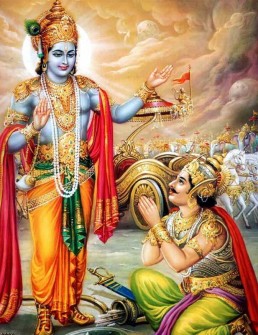Gita Chapter 8 – Verse 5 « »
अन्तकाले च मामेव स्मरन्मुक्त्वा कलेवरम् ।
यः प्रयाति स मद्भावं याति नास्त्यत्र संशयः ॥ ८-५॥
antakāle ca māmeva smaranmuktvā kalevaram
yaḥ prayāti sa madbhāvaṃ yāti nāstyatra saṃśayaḥ 8-5
And whosoever, leaving the body, goes forth remembering Me alone, at the time of his death, he attains My being; there is no doubt about this.
antakāle = at the end of life; ca = also; māṃ = Me; eva = certainly; smaran = remembering; muktvā = quitting; kalevaraṃ = the body; yaḥ = he who; prayāti = goes; saḥ = he; madbhāvaṃ = My nature; yāti = achieves; na = not; asti = there is; atra = here; saṃśayaḥ = doubt.;

